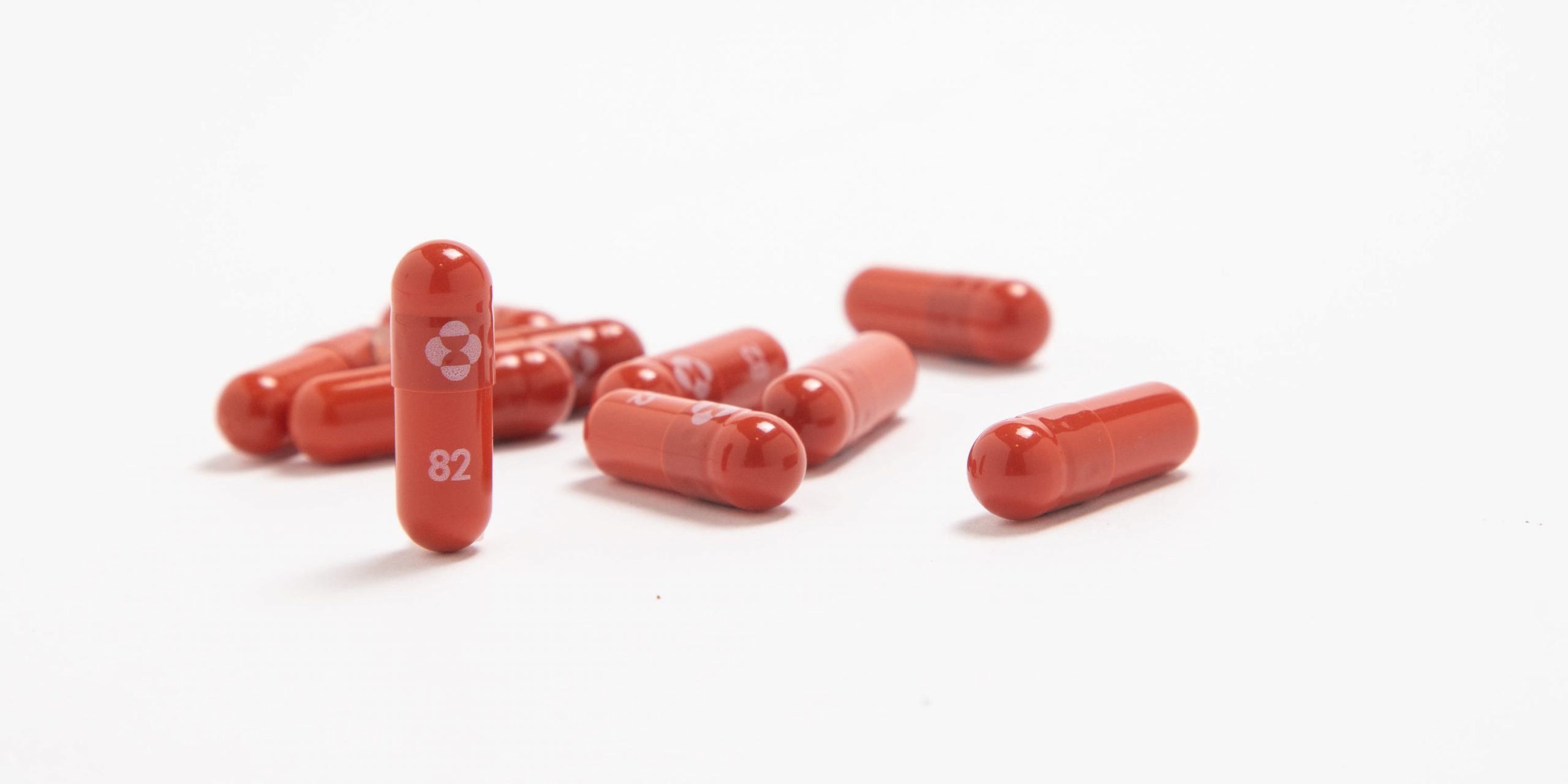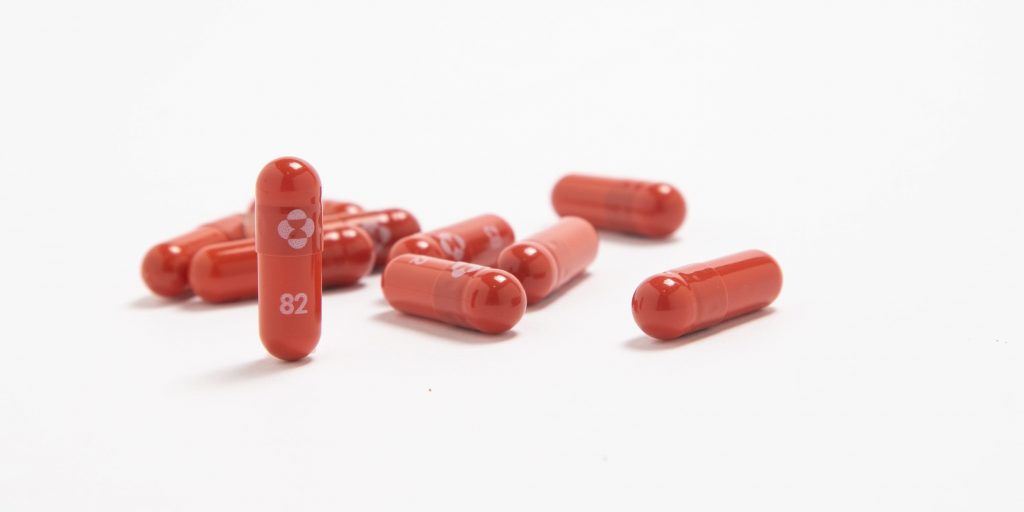
- The first COVID-19 pill is closer to reality, as an FDA panel voted in favor on Tuesday.
- But the group also recommended limiting its use to people at high risk of severe disease.
- Merck's drug reduced hospitalizations and deaths by 30% compared to a placebo.
A pill to treat COVID-19 just got closer to reality, as the Food and Drug Administration's expert panel voted Tuesday in favor of greenlighting Merck's antiviral treatment.
The thumbs-up was not without controversy, however, as several panelists raised concerns over the drug's safety risks and modest efficacy levels. Overall, the group voted 13-10 that the benefits outweigh the risks of using the drug for infected people at high risk of severe disease who are within five days of developing symptoms.
Low efficacy and safety risks concerned some experts
The FDA is still reviewing the drug, called molnupiravir, and deciding whether to grant an emergency use authorization. While the agency typically follows the advice of its expert panel, it is not required to do so.
In a clinical trial, Merck enrolled more than 1,400 unvaccinated people who recently got COVID-19 and are at high risk of severe disease. Volunteers randomly received either Merck's treatment, a 40-pill regimen given over five days, or dummy pills that acted as a control group.
The final analysis showed Merck's drug reduced hospitalizations and deaths by 30%. That figure took experts and analysts by surprise, as an interim analysis announced in October showed a 48% reduction.
The FDA also highlighted several safety concerns with the drug in its review of lab and animal studies. The agency noted several potential risks, including risk to fetuses, impaired bone and cartilage growth, and mutagenicity.
These safety risks come from Merck's drug being a nucleoside, a type of antiviral that intentionally inserts errors into the copying process of a virus. This obstructs the virus' quest to replicate itself. But that also carries the theoretical risk the drug could interact and mutate human cells, with scientists debating how serious a risk this is.
Those safety risks were enough of a reason for some voting members to determine that the risks outweigh the benefits.
"I felt that the overall absolute effect in the total trial population was modest at best," said Dr. Sankar Swaminathan, a an infectious-disease expert at the University of Utah Health, who voted no. "The risk of mutagenic effects on the patient is not firmly established or characterized, and given the large potential population affected, the risk of widespread effects on potential birth defects and especially delayed effects on the male has not been adequately studied."
Conflict over use during pregnancy
Several voting members said they wanted to specifically exclude people who are pregnant from the pill's potential authorization.
"I think the FDA should not approve it for the use in pregnant women except under really exceptional circumstances," said David Eastman, a biology professor at University of California, Riverside, who voted yes. "I think they should limit it to high-risk individuals."
Others said the decision should be left up to the pregnant person considering taking the drug, along with a medical counselor who may help inform the decision.
"As a woman of child-bearing age, I don't think I would want to take this drug, not knowing the effects it could have on my unborn child," said Roblena Walker, a consumer representative selected to advise the committee. She voted yes, given that the drug's risks and benefits will be weighed further before it is authorized.
Merck's drug could be the first COVID-19 pill
If approved, molnupiravir would be the first pill to treat COVID-19 authorized by the FDA, an advance that could simplify and expand access to medical care for patients. While several antibody therapies have been authorized, they are expensive and can require a lenghty IV infusion.
Molnupiravir was originally developed as a treatment for the flu. Merck licensed the drug in July 2020 from Ridgeback Biotherapeutics, a small Miami biotech.
The federal government is betting big on molnupiravir. In June, the US agreed to pay $1.2 billion for enough pills to treat 1.7 million people. And in November, it reached a second deal to secure 1.4 million more treatment courses. In total, $2.2 billion is on the line, with both deals contingent on the FDA authorizing the treatment.
But analysts are already expecting Merck's pill may not be widely used. Cowen analyst Steve Scala wrote in a Monday research note he thinks it will be mainly used when other treatment options aren't available. That is because of competing drugs, notably Pfizer's COVID-19 pill, which shows a much higher efficacy and may not carry the safety concerns of molnupiravir.
Better drugs may be on the horizon
In a similar patient population as Merck's study, Pfizer's pill reduced hospitalizations and deaths by 89%. That drug also doesn't carry the same mutagenic risks as Merck's, because it disrupts the virus in a different way, blocking an enzyme that plays a key role in the virus' copying process.
Wall Street analysts forecast Pfizer's pill to turn into a blockbuster drug. Morgan Stanley projects $26 billion in 2022 sales, while SVB Leerink expects $24 billion in 2022. The FDA is also reviewing Pfizer's drug for an emergency OK.
In the meantime, Merck's pill could be an option for populations with a high risk of developing severe COVID-19. John Coffin, a professor at Tufts University, voted yes with the suggestion that the initial authorization be reserved for high-risk groups, like individuals older than 60 who have not been vaccinated.
"I'm not sure if this is really the one we've been waiting for, but it's all we've got at the moment," Coffin said.










